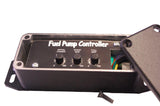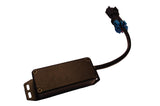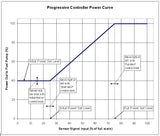Fuel Pump Controller - MAP Sensor Input
The EPP Progressive Fuel Pump Controller provides a compact, high efficiency microprocessor based fuel pump motor control. It incorporates a 5 volt electronic sensor input to vary the speed of the fuel pump with the sensor input. This 5 volt input is typically tapped from a MAP Sensor used in contemporary electronic engine control computers. However, the control module can use other 5 volt sensor inputs such as throttle position and mass air flow sensors as well.
Controller is designed with innovative control circuitry to achieve exceedingly high efficiency and safe motor control. The regenerative circuitry allows unused power to be recycled back to the battery and eliminates all electrical stress on the motor’s windings and commutator. Lesser designs as well as mechanical relay systems can create harmful electrical stress on these motor components that will lead to premature motor failures.
The Fuel Pump Controller can drive fuel pumps up to 30 amps total current draw. With the incorporated trigger input, the controller can be set up to be a secondary drive for two pump systems.
The control module is built in a fully enclosed alloy housing. The control housing incorporates an integral mounting flange for simple mounting. Also, the unit provides inline disconnect connectors to ease installation and allow unit to be easily removed from vehicle without needing to cut wires or connections.
Three adjustable parameter knobs can be set by the user to provide for a simple, yet very flexible, customized fuel pump operation. These parameters are:
- Fuel Pump Initial Power: This knob adjusts the baseline power delivered to the pump. This initial power level remains constant from engine idle up to the point proportional control comes in.
- Start Proportional Power: This knob adjusts the percent of input signal that the controller begins to ramp up fuel pump power proportionally to input signal.
- Full Power: This knob adjusts the percent of input signal that the controller reaches full system power.






